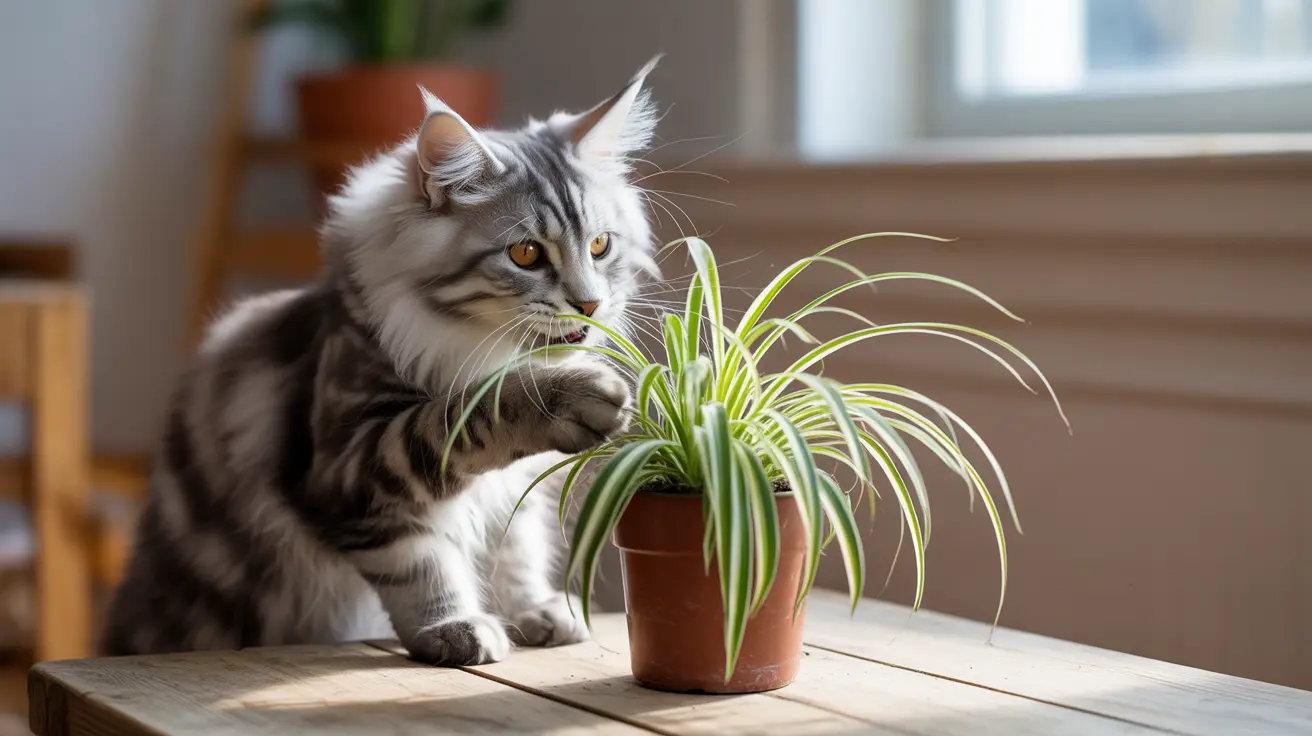Are Spider Plants Safe for Your Cat?
Spider plants are considered non-toxic by the ASPCA and veterinary experts. Unlike many other common houseplants that can be dangerous to cats, spider plants won't cause severe poisoning or long-term health issues. However, this doesn't mean unrestricted consumption is recommended.
While technically safe, eating spider plants can still cause mild digestive upset in some cats. The plant's fibrous nature can irritate your cat's digestive system, potentially leading to temporary discomfort.
Understanding Your Cat's Attraction to Spider Plants
Spider plants seem to hold a particular fascination for cats, and there are several reasons for this attraction. Their dangling, ribbon-like leaves naturally trigger a cat's hunting instincts, making them irresistible play targets. Some experts suggest that spider plants might contain compounds that create mild hallucinogenic effects in cats, similar to but weaker than catnip.
Additionally, cats instinctively seek out grass and plants to aid their digestion and help with hairball control. In an indoor environment, spider plants often become an easily accessible substitute for natural grass.
Potential Health Effects and Symptoms
While spider plants aren't toxic, ingestion can lead to several mild symptoms:
- Temporary vomiting
- Mild diarrhea
- Excessive drooling
- Decreased appetite
- Occasional lethargy
These symptoms typically resolve on their own within 24 hours. However, excessive consumption can lead to more persistent digestive issues or dehydration in some cases.
Prevention and Protection Strategies
To keep your cat from eating spider plants while maintaining their decorative appeal, consider these effective solutions:
- Place plants in hanging baskets well out of reach
- Use cat deterrent sprays around plant areas
- Provide cat-safe alternatives like wheat grass
- Create designated "cat gardens" with pet-safe plants
- Use physical barriers or plant stands
- Ensure adequate environmental enrichment to prevent boredom
Treatment and When to Seek Help
If you catch your cat eating spider plant leaves, don't panic. Monitor them for the next 12-24 hours for any concerning symptoms. Most cases resolve without intervention, but contact your veterinarian if you notice:
- Prolonged vomiting (more than 24 hours)
- Signs of dehydration
- Significant lethargy
- Loss of appetite lasting more than a day
- Difficulty breathing or unusual behavior
Frequently Asked Questions
Are spider plants safe for cats to eat?
Yes, spider plants are non-toxic to cats, but consumption should still be limited as they can cause mild digestive upset.
What symptoms might my cat show if it eats spider plant leaves?
Common symptoms include mild vomiting, diarrhea, drooling, and temporary loss of appetite. These typically resolve within 24 hours.
Why do cats seem attracted to spider plants compared to other houseplants?
Cats are drawn to spider plants due to their dangling leaves that trigger hunting instincts, possible mild hallucinogenic properties, and their accessibility as an indoor grass substitute.
How can I prevent my cat from chewing on my spider plants?
Use hanging planters, create physical barriers, provide alternative cat-safe plants, and use deterrent sprays to keep cats away from spider plants.
What should I do if my cat eats a lot of spider plant and starts vomiting?
Monitor your cat closely. If vomiting persists beyond 24 hours or is accompanied by lethargy or dehydration, contact your veterinarian.






